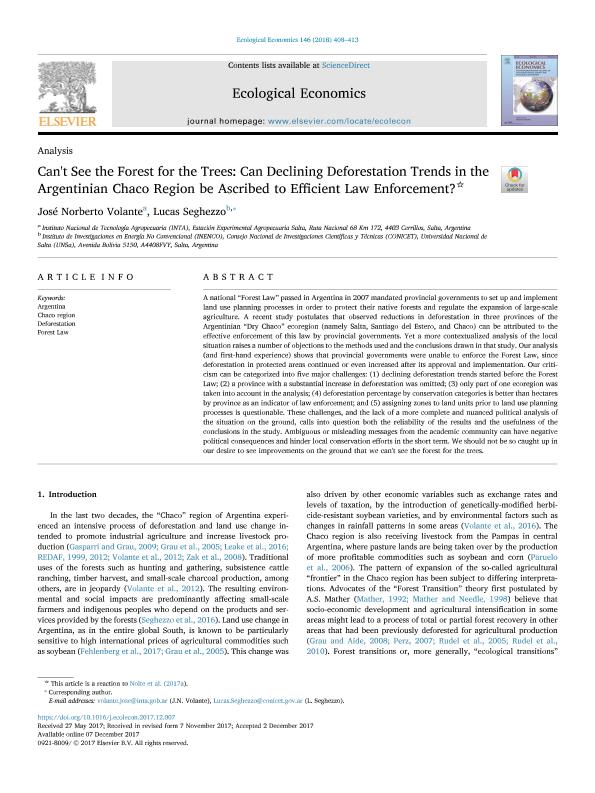Mostrar el registro sencillo del ítem
dc.contributor.author
Volante, José Norberto

dc.contributor.author
Seghezzo, Lucas

dc.date.available
2019-11-29T18:27:15Z
dc.date.issued
2018-04
dc.identifier.citation
Volante, José Norberto; Seghezzo, Lucas; Can't See the Forest for the Trees: Can Declining Deforestation Trends in the Argentinian Chaco Region be Ascribed to Efficient Law Enforcement?; Elsevier Science; Ecological Economics; 146; 4-2018; 408-413
dc.identifier.issn
0921-8009
dc.identifier.uri
http://hdl.handle.net/11336/90961
dc.description.abstract
A national “Forest Law” passed in Argentina in 2007 mandated provincial governments to set up and implement land use planning processes in order to protect their native forests and regulate the expansion of large-scale agriculture. A recent study postulates that observed reductions in deforestation in three provinces of the Argentinian “Dry Chaco” ecoregion (namely Salta, Santiago del Estero, and Chaco) can be attributed to the effective enforcement of this law by provincial governments. Yet a more contextualized analysis of the local situation raises a number of objections to the methods used and the conclusions drawn in that study. Our analysis (and first-hand experience) shows that provincial governments were unable to enforce the Forest Law, since deforestation in protected areas continued or even increased after its approval and implementation. Our criticism can be categorized into five major challenges: (1) declining deforestation trends started before the Forest Law; (2) a province with a substantial increase in deforestation was omitted; (3) only part of one ecoregion was taken into account in the analysis; (4) deforestation percentage by conservation categories is better than hectares by province as an indicator of law enforcement; and (5) assigning zones to land units prior to land use planning processes is questionable. These challenges, and the lack of a more complete and nuanced political analysis of the situation on the ground, calls into question both the reliability of the results and the usefulness of the conclusions in the study. Ambiguous or misleading messages from the academic community can have negative political consequences and hinder local conservation efforts in the short term. We should not be so caught up in our desire to see improvements on the ground that we can't see the forest for the trees.
dc.format
application/pdf
dc.language.iso
eng
dc.publisher
Elsevier Science

dc.rights
info:eu-repo/semantics/openAccess
dc.rights.uri
https://creativecommons.org/licenses/by-nc-sa/2.5/ar/
dc.subject
ARGENTINA
dc.subject
CHACO REGION
dc.subject
DEFORESTATION
dc.subject
FOREST LAW
dc.subject.classification
Ciencias Medioambientales

dc.subject.classification
Ciencias de la Tierra y relacionadas con el Medio Ambiente

dc.subject.classification
CIENCIAS NATURALES Y EXACTAS

dc.title
Can't See the Forest for the Trees: Can Declining Deforestation Trends in the Argentinian Chaco Region be Ascribed to Efficient Law Enforcement?
dc.type
info:eu-repo/semantics/article
dc.type
info:ar-repo/semantics/artículo
dc.type
info:eu-repo/semantics/publishedVersion
dc.date.updated
2019-10-18T18:26:57Z
dc.journal.volume
146
dc.journal.pagination
408-413
dc.journal.pais
Países Bajos

dc.journal.ciudad
Amsterdam
dc.description.fil
Fil: Volante, José Norberto. Instituto Nacional de Tecnología Agropecuaria. Centro Regional Salta. Estación Experimental Agropecuaria Salta; Argentina
dc.description.fil
Fil: Seghezzo, Lucas. Consejo Nacional de Investigaciones Científicas y Técnicas. Centro Científico Tecnológico Conicet - Salta. Instituto de Investigaciones en Energía no Convencional. Universidad Nacional de Salta. Facultad de Ciencias Exactas. Departamento de Física. Instituto de Investigaciones en Energía no Convencional; Argentina
dc.journal.title
Ecological Economics

dc.relation.alternativeid
info:eu-repo/semantics/altIdentifier/url/https://www.sciencedirect.com/science/article/pii/S0921800917307668
dc.relation.alternativeid
info:eu-repo/semantics/altIdentifier/doi/http://dx.doi.org/10.1016/j.ecolecon.2017.12.007
Archivos asociados
